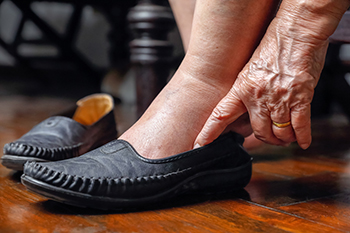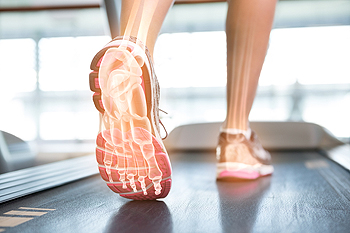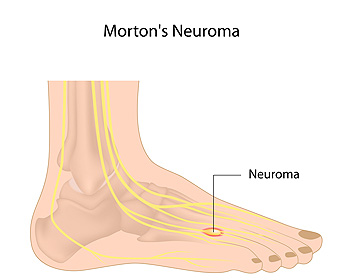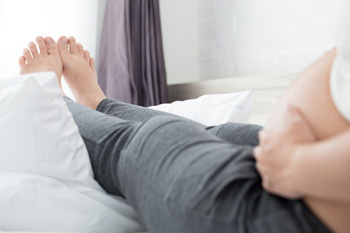December 2021
Why the Ball of Your Foot Feels Like It Is on Fire
Morton’s neuroma occurs when the tissue surrounding a nerve in the toes thickens in response to the nerve becoming entrapped, or otherwise irritated. This usually occurs between the third and fourth toes, however, it can also occur between the second and third toes. Morton’s neuroma can cause a burning pain in the ball of the foot. People with this condition sometimes explain the pain they feel as walking on a pebble or having a bunched-up sock in the front of their shoe. The toes may also feel numb or tingling, and there may be difficulty walking. Wearing shoes that are too tight or that compress your toes may sometimes contribute to the formation of Morton’s neuroma. This can include ski boots and ballet slippers too. Other foot dysfunctions that squeeze or put pressure on the toes can be contributing factors, such as flat feet, bunions, hammertoes, and high arches. Certain repetitive sporting activities may also be responsible. If you ever experience any of the symptoms mentioned here, call a podiatrist. They will examine you and run diagnostics to rule out other possible conditions and create a treatment plan to relieve pain and treat the underlying thickened tissue and nerve compression.
Morton’s neuroma is a very uncomfortable condition to live with. If you think you have Morton’s neuroma, contact Dr. Robert Graser of Graser Podiatry and Bunion Surgery Institute. Our doctor will attend to all of your foot care needs and answer any of your related questions.
Morton’s Neuroma
Morton's neuroma is a painful foot condition that commonly affects the areas between the second and third or third and fourth toe, although other areas of the foot are also susceptible. Morton’s neuroma is caused by an inflamed nerve in the foot that is being squeezed and aggravated by surrounding bones.
What Increases the Chances of Having Morton’s Neuroma?
- Ill-fitting high heels or shoes that add pressure to the toe or foot
- Jogging, running or any sport that involves constant impact to the foot
- Flat feet, bunions, and any other foot deformities
Morton’s neuroma is a very treatable condition. Orthotics and shoe inserts can often be used to alleviate the pain on the forefront of the feet. In more severe cases, corticosteroids can also be prescribed. In order to figure out the best treatment for your neuroma, it’s recommended to seek the care of a podiatrist who can diagnose your condition and provide different treatment options.
If you have any questions, please feel free to contact our office located in Boerne, . We offer the newest diagnostic and treatment technologies for all your foot care needs.
Ways to Avoid or Reduce Diabetic Foot Problems
 Many people who have diabetes also end up developing foot problems. The best way to avoid them is to control blood sugar levels everyday, which can help to keep nerve and blood vessel damage from increasing. There are also several ways to help avoid foot sores and infection. Check the feet each day, looking for cuts, redness and changes to the skin and toenails. Wash the feet daily and be sure to dry them thoroughly to avoid buildup of moisture. Put your feet up as much as possible, and wriggle the toes and circle the feet. Avoid wearing tight socks that can restrict circulation to the feet. If you notice sores or blisters that won’t heal, if the skin is red, warm and painful, or if you start to notice an odor emanating from the feet, it would be wise to consult a podiatrist as soon as possible for a diagnosis and treatment options.
Many people who have diabetes also end up developing foot problems. The best way to avoid them is to control blood sugar levels everyday, which can help to keep nerve and blood vessel damage from increasing. There are also several ways to help avoid foot sores and infection. Check the feet each day, looking for cuts, redness and changes to the skin and toenails. Wash the feet daily and be sure to dry them thoroughly to avoid buildup of moisture. Put your feet up as much as possible, and wriggle the toes and circle the feet. Avoid wearing tight socks that can restrict circulation to the feet. If you notice sores or blisters that won’t heal, if the skin is red, warm and painful, or if you start to notice an odor emanating from the feet, it would be wise to consult a podiatrist as soon as possible for a diagnosis and treatment options.
Diabetic foot care is important in preventing foot ailments such as ulcers. If you are suffering from diabetes or have any other concerns about your feet, contact Dr. Robert Graser from Graser Podiatry and Bunion Surgery Institute. Our doctor can provide the care you need to keep you pain-free and on your feet.
Diabetic Foot Care
Diabetes affects millions of people every year. The condition can damage blood vessels in many parts of the body, especially the feet. Because of this, taking care of your feet is essential if you have diabetes, and having a podiatrist help monitor your foot health is highly recommended.
The Importance of Caring for Your Feet
- Routinely inspect your feet for bruises or sores.
- Wear socks that fit your feet comfortably.
- Wear comfortable shoes that provide adequate support.
Patients with diabetes should have their doctor monitor their blood levels, as blood sugar levels play such a huge role in diabetic care. Monitoring these levels on a regular basis is highly advised.
It is always best to inform your healthcare professional of any concerns you may have regarding your feet, especially for diabetic patients. Early treatment and routine foot examinations are keys to maintaining proper health, especially because severe complications can arise if proper treatment is not applied.
If you have any questions please feel free to contact our office located in Boerne, . We offer the newest diagnostic and treatment technologies for all your foot and ankle needs.
Understanding Your Gait
 Your gait is the manner in which you walk. When a patient has a unique walking style or an abnormal gait, a podiatrist will often conduct a gait analysis to study their walking habits. Gait analysis can tell a lot about a person's body movements. This can help to determine what is causing imbalances in areas such as the hamstrings, glutes, quads, or calves. The analysis can take place on a treadmill or by simply walking down a hallway. In even more complex analyses, sensors and video recordings may be used to diagnose any areas of concern as the patient walks. Anyone struggling with pain as they walk should consult with a podiatrist to receive a proper gait analysis, and to customize a treatment plan that is specific to their walking pattern.
Your gait is the manner in which you walk. When a patient has a unique walking style or an abnormal gait, a podiatrist will often conduct a gait analysis to study their walking habits. Gait analysis can tell a lot about a person's body movements. This can help to determine what is causing imbalances in areas such as the hamstrings, glutes, quads, or calves. The analysis can take place on a treadmill or by simply walking down a hallway. In even more complex analyses, sensors and video recordings may be used to diagnose any areas of concern as the patient walks. Anyone struggling with pain as they walk should consult with a podiatrist to receive a proper gait analysis, and to customize a treatment plan that is specific to their walking pattern.
If you have any concerns about your feet, contact Dr. Robert Graser from Graser Podiatry and Bunion Surgery Institute. Our doctor can provide the care you need to keep you pain-free and on your feet.
Biomechanics in Podiatry
Podiatric biomechanics is a particular sector of specialty podiatry with licensed practitioners who are trained to diagnose and treat conditions affecting the foot, ankle and lower leg. Biomechanics deals with the forces that act against the body, causing an interference with the biological structures. It focuses on the movement of the ankle, the foot and the forces that interact with them.
A History of Biomechanics
- Biomechanics dates back to the BC era in Egypt where evidence of professional foot care has been recorded.
- In 1974, biomechanics gained a higher profile from the studies of Merton Root, who claimed that by changing or controlling the forces between the ankle and the foot, corrections or conditions could be implemented to gain strength and coordination in the area.
Modern technological improvements are based on past theories and therapeutic processes that provide a better understanding of podiatric concepts for biomechanics. Computers can provide accurate information about the forces and patterns of the feet and lower legs.
Understanding biomechanics of the feet can help improve and eliminate pain, stopping further stress to the foot.
If you have any questions please feel free to contact our office located in Boerne, . We offer the newest diagnostic and treatment technologies for all your foot and ankle needs.
How Expectant Mothers Can Ease the Discomfort of Edema
Pregnancy is often accompanied by swollen feet and ankles. This occurs because the body is creating and retaining more fluid, and the uterus is growing. Both of these factors can cause the feet and ankles to swell, a condition known as edema. You can help ease the symptoms of edema by sleeping on the left side of your body to reduce pressure on the vein that returns blood to your heart, and by trying not to stand for prolonged periods of time. While sitting, avoid crossing your legs, and try to elevate and stretch them as often as possible. Maternity stockings may help, as well as exercising regularly, keeping yourself hydrated, and trying to stay as cool as you can in hot weather. Your feet expand during pregnancy and are also under a great deal more pressure. Check with a podiatrist for recommendations on footwear and orthotics to help your feet withstand the extra weight and pressure, as well as other methods of reducing edema.
Pregnant women with swollen feet can be treated with a variety of different methods that are readily available. For more information about other cures for swollen feet during pregnancy, consult with Dr. Robert Graser from Graser Podiatry and Bunion Surgery Institute. Our doctor will attend to all of your foot and ankle needs.
What Foot Problems Can Arise During Pregnancy?
One problem that can occur is overpronation, which occurs when the arch of the foot flattens and tends to roll inward. This can cause pain and discomfort in your heels while you’re walking or even just standing up, trying to support your baby.
Another problem is edema, or swelling in the extremities. This often affects the feet during pregnancy but tends to occur in the later stages.
How Can I Keep My Feet Healthy During Pregnancy?
- Wearing orthotics can provide extra support for the feet and help distribute weight evenly
- Minimize the amount of time spent walking barefoot
- Wear shoes with good arch support
- Wear shoes that allow for good circulation to the feet
- Elevate feet if you experience swelling
- Massage your feet
- Get regular, light exercise, such as walking, to promote blood circulation to the feet
If you have any questions please feel free to contact our office located in Boerne, . We offer the newest diagnostic and treatment technologies for all your foot and ankle needs.
Blog Archives
- April 2024
- March 2024
- February 2024
- January 2024
- December 2023
- November 2023
- October 2023
- September 2023
- August 2023
- July 2023
- June 2023
- May 2023
- April 2023
- March 2023
- February 2023
- January 2023
- December 2022
- November 2022
- October 2022
- September 2022
- August 2022
- July 2022
- June 2022
- May 2022
- April 2022
- March 2022
- February 2022
- January 2022
- December 2021
- November 2021
- October 2021
- September 2021
- August 2021
- July 2021
- June 2021
- May 2021
- April 2021
- March 2021
- February 2021
- January 2021
- December 2020
- November 2020
- October 2020
- September 2020
- August 2020
- July 2020
- June 2020
- May 2020
- April 2020
- March 2020
- February 2020
- January 2020
- December 2019
- November 2019
- October 2019
- September 2019
- August 2019
- July 2019
- June 2019
- May 2019
- April 2019
- March 2019
- February 2019
- January 2019
- December 2018
- November 2018
- October 2018
- September 2018
- August 2018
- July 2018
- June 2018
- May 2018











